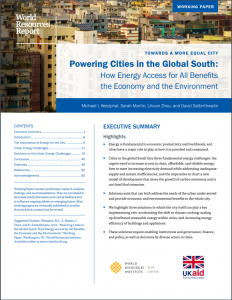Full Title: Powering Cities in the Global South: How Energy Access for All Benefits the Economy and the Environment
Author(s): Michael I. Westphal, Sarah Martin, Lihuan Zhou, and David Satterthwaite
Publisher(s): World Resources Institute
Publication Date: September 1, 2017
Full Text: Download Resource
Description (excerpt):
This working paper is part of the larger World Resources Report Towards a More Equal City, which views sustainability as composed of three interrelated issues: the economy, the environment, and equity. We use the equitable provision of urban services as the premise for examining whether meeting the needs of the under-served can improve the other two dimensions of sustainability.
To address the question of how to power the city for all, we have conducted extensive literature reviews and consulted with international organizations such as the Global Alliance for Clean Cookstoves, the Collaborative Labeling and Appliance Standards Program, the Global Buildings Performance Network, the Energy Sector Management Assistance Program, and the World LPG Association.
Our goal is to draw attention to the under-appreciated problem of urban energy access. This paper takes a unique approach in that it looks not only at how to improve energy services for the under-served, but also at how various solutions to the access challenge could impact the city’s overall economic and environmental well-being. We believe that expanding access to modern energy sources and systems to include the poor and marginalized is not in conflict with action to mitigate climate change. While energy is often considered outside the purview of cities, our paper argues that energy is a fundamental urban issue and that cities have a large and essential role to play in providing clean, affordable, and reliable energy to all their residents.
An equally important goal is to inform urban change agents—a broad suite of actors that include national and regional governments, international financial institutions, civil society, and the private sector—on priority urban energy action areas
